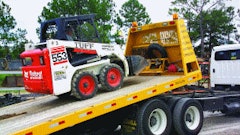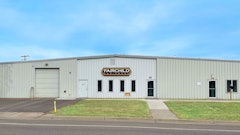
In my opinion there are only two types of businesses: Those that are proud to be in business and those that are lucky to be in business.
We all know those who are lucky to still be in business, the same people who only crackfill half of the cracks they should, hoping a sealcoat will hide the others long enough for them to get paid. These same people use a cheaper product than was specified, gambling they won't get tested while on-site. And finally when it catches up to them, a quick paperwork shuffle allows them to re-enter the market with a new name, colorful logo, and of course new P.O. box number. Then this wolf in sheep's clothing begins again their business of artificially low bidding.
In contrast there are those companies where their name and reputation is an asset, not a liability. These businesses have discovered quality as the lifeblood of success. Contrary to popular belief, quality is not a reputation that is built on the job site, it starts much earlier in the office.
Quality has nothing to do with how straight you paint your lines, how even your sealcoat is, or even how good your foreman is. Quality is built through the development of a culture of quality that permeates every level of the firm, from the highest position to the front line laborer.
Dr. Edwards Deming is known as the father of quality. In the early 1950's Deming was having difficulty gaining acceptance of his different approach on quality, until a Post WWII economically depressed Japan asked him to revitalize Japan as a leader in quality. Today the Japanese are one of the leaders in producing some of the highest quality goods. Why was Deming's approach to quality so controversial? Because he emphasized the lead role in developing quality as management's responsibility – not quality engineers, design engineers, or line workers. Management's developing a culture of quality is the best way to ensure quality performance.
Quality is a general term. If you equate quality with a job or product performance you have missed the broader picture. There are a lot of good contractors who can paint straight lines and fix potholes. There are fewer contractors who can say "I'll be there on Tuesday at 7 a.m. and have it done by 5 p.m." Similarly, many contractors can say "I'll build what you've specified," but fewer can say "I'll build you what you want and need." In short, many companies cannot compete on price or product features. Too many solutions are becoming commoditized where the price of emulsions, metal, concrete, and asphalt have centralized for all players.
Similarly products can be reverse engineered in a matter of days. An equipment manufacturer may hang its hat on a new product feature, but if that feature has real market value, competitors will shortly introduce similar features. The new competitive environment engages competition and builds a competitive advantage at all levels of your organization, through integrating quality in all aspects of their business. So how do you develop quality and a company-wide competitive advantage?
Here are some tips:
1. View all aspects of the business as an opportunity to impress the customer and reflect a culture of quality. From the receptionist, to the sales person, to the owner, to the laborer, all customer interactions are an opportunity to develop and solidify a profitable relationship.
2. Keep your promises and deadlines, if you promise to visit the jobsite on Monday morning, then on Monday, sometime before noon, visit the jobsite. Pay your vendors on time and expect to be paid on-time.
3. Quality communication results in an understanding. Document that understanding in writing. Just because you "get it" don't assume they do. Quality sales and customer service is important like quality materials and installation are.
4. Understand the customer's needs. Even if you built the project right, the customer may not be satisfied if it doesn't meet their needs. If the customer is requesting a seal coat, and they really need an overlay, give them that advice, and let them make the informed decision.
5. Service the client after the project is completed, don't be afraid to follow up and make sure the client is still happy with your work after 90 days. Make it a good opportunity to discuss your client's future projects.
6. Most important, as a leader be an example the way you discuss your clients and their projects will develop a culture in your company. If you are always respectful and conscious of your quality work and reputation, so will your employees.
Let's face it: companies that perform poor work have managers that allow it. Managers need to take responsibility and understand that all the work performed by all employees reflects on them and the firm. Management needs to be dedicated to quality at all levels and expect no less. Doing so will create a reputation that will be an asset and profit center for the company.
Jared Everett, CPFM, is owner of Everett Professional Services LLC, and has worked for large government entities as a buyer and project manager of pavement services. He also has worked as director of sales and marketing for an asphalt maintenance firm. He will present "Strengthen Your Sales & Customer Service Skills" at National Pavement Expo, Feb. 15-18 in Charlotte, NC. For information visit www.nationalpavementexpo.com.Photo copyright by Everett Professional Servicesand its licensors.




























